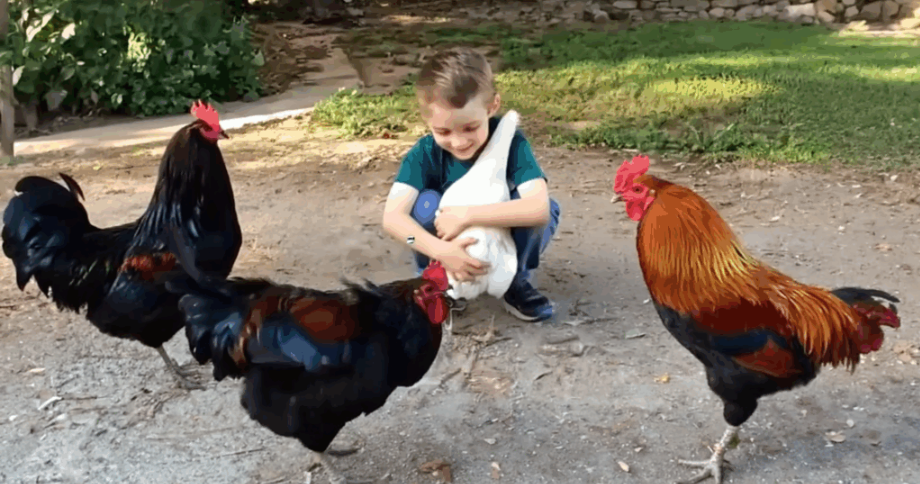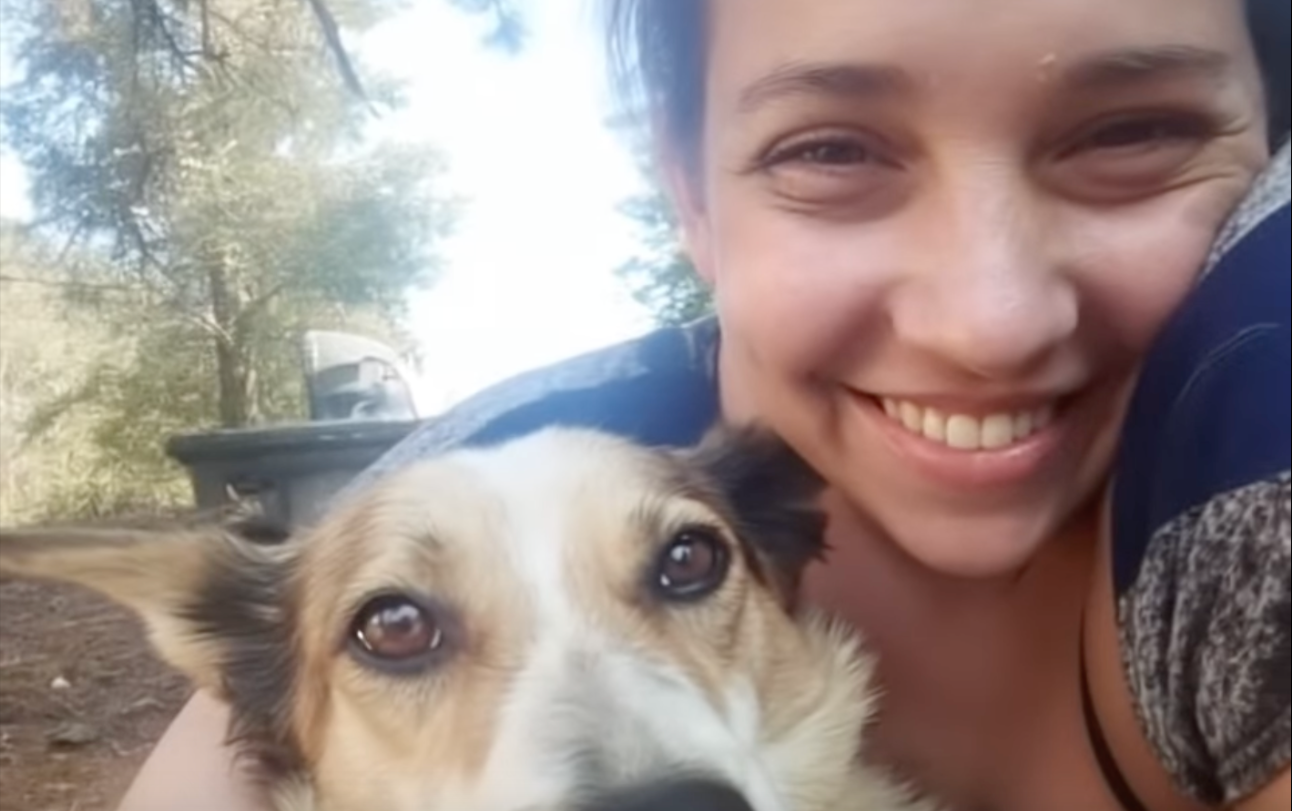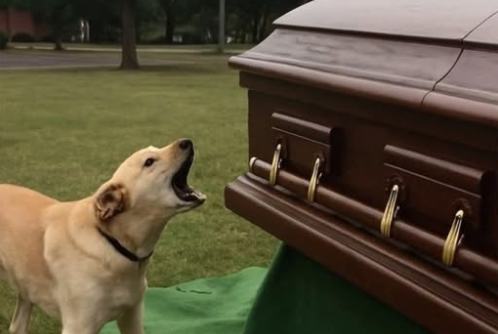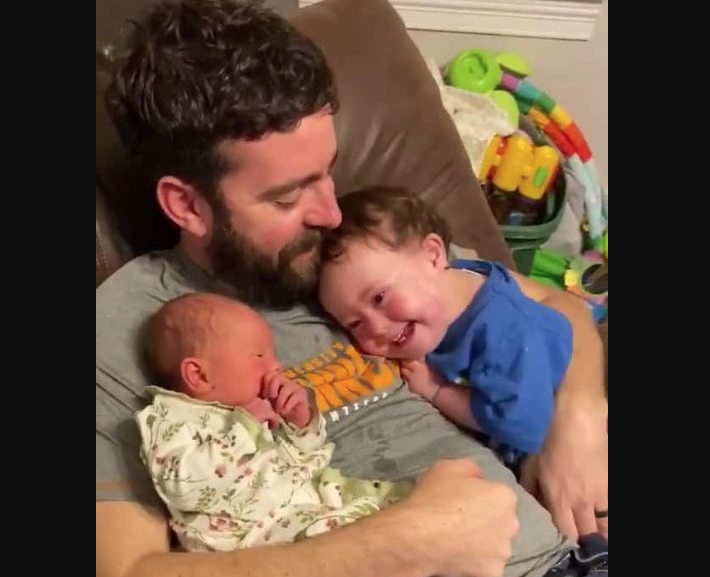At first, it was just a sweet, innocent moment. My little cousin Eli squatted down in the yard, giggling as the chickens wandered calmly around his sneakers. He reached out, scooped up the fluffy white one we affectionately call Marbles, and hugged her like a favorite stuffed animal. I was busily snapping pictures, already envisioning the perfect Instagram caption.
But then the other chickens froze. Like, literally froze—all of them. Three roosters, completely mid-step, just staring intently. Their heads tilted slightly in perfect sync, eyes locked on Eli and Marbles as if something had gone terribly wrong. I laughed nervously, but Eli didn’t seem to notice a thing. He just kept holding Marbles, gently rocking her like a precious baby.
That’s when I clearly saw it. The rooster we call Boss—usually the noisiest, peckiest nightmare on legs—backed up slowly. Not away from Eli… but deliberately toward the shed. And the others? They followed, surprisingly. Not like typical chickens at all. Like they were waiting for something to happen.
I started quickly toward Eli, telling him firmly it was time to put Marbles down now. But he looked up at me, genuinely confused, and said softly: “She’s not letting go of me.” I said, “What do you mean she’s not—”
Then I saw his arms. There were tiny white scratches forming—three of them—shaped almost eerily like letters. And as I stepped closer, my heart pounding, I realized they were spelling something. The first letter was a D. The second looked unmistakably like an O. And just as I leaned in to clearly see the third…
It was an N. DON. I blinked, bewildered. “Don? Who’s Don?” Eli looked at me, his eyes wide and glassy, distant. “I don’t know,” he whispered, barely audible. “But I think… she does know.”
I looked down at Marbles, still perfectly nestled in his arms. Her eyes were wide open, but there was something profoundly weird about them—like she wasn’t really looking at us, but disconcertingly through us. And her feathers, usually soft and downy, had started to bristle ever so slightly, like static electricity was crawling through them. Behind me, I heard the low creak of the shed door slowly swinging open. Boss had reached it, and now he was methodically pecking at the old wood. Peck. Peck. Peck. Rhythmic, precise, chilling. I felt a deep chill ripple through my spine.
“Okay,” I said carefully, trying to keep my voice steady, “we’re going inside. Now.” Eli stood up slowly, still protectively cradling Marbles. She hadn’t moved at all, not even a single feather flutter. But the scratches on his arms had noticeably deepened, like something invisible was writing with tiny, sharp blades. And the letters kept going, relentlessly. Now it clearly read: DON’T.
“Don’t what?” I muttered under my breath, my mind racing.
“I think she’s scared,” Eli said, his voice barely a breath, filled with a strange apprehension. “Of them.” We walked quickly, cutting directly through the yard toward the house. The roosters didn’t move an inch. They just watched us intently. Unblinking. Silent.
When we got inside, I quickly locked the back door, pulled the curtain completely shut, and made Eli sit on the couch. He still wouldn’t put Marbles down, and at this point, I wasn’t about to forcefully make him. Something genuinely strange was going on—and whether it was supernatural or just some bizarre, freaky coincidence, I wasn’t taking any chances whatsoever. I grabbed my phone and immediately called Nana.
She was the one who gave us the chickens in the first place, said they were “special stock” from her secluded hometown in the mountains. At the time, I simply thought she meant they laid consistently good eggs. No answer. I tried calling again. Still nothing but ringing.
“Is she okay?” Eli asked softly, his voice full of concern. “I’m sure she’s fine,” I lied convincingly, trying to sound normal. “She’s probably just in the garden, busy.” Eli nodded slowly, but his eyes were still glued intently to Marbles. Then he said something that sent a fresh, cold wave of profound unease through me. “She’s talking to me, she really is.”
I froze, my blood running cold. “What do you mean by that?” “Not with actual words. But with vivid pictures. Like dreams… but I’m wide awake.” “What do you vividly see?” I pressed, wanting details.
He paused for a long moment, then said, his voice quiet: “A man. In the shed. Buried there.” That’s when my stomach dropped completely. Because three years ago, before we even moved into this property, it had belonged to someone else entirely. A man named Don Whitmer.
The very same name being mysteriously scratched into Eli’s skin. I did a quick, frantic search on my phone. Don Whitmer, former owner, went suddenly missing one summer afternoon. No foul play was ever officially suspected. They had widely reported he’d left a simple note saying he was going to Florida to start a fresh, new life. No body was ever found, ever.
I stared intensely at Marbles, who still hadn’t moved a muscle, completely serene. “You think…” I whispered, almost too afraid to fully finish the terrifying thought. “You think she’s actually trying to tell us where he is buried?” Eli nodded solemnly. “She showed me the exact spot. Under the very back of the shed. By the deep roots of that big oak tree.”
I swallowed hard, my throat dry. I desperately didn’t want this to be real, not truly. But something deep in my gut told me we absolutely had to check. And not just out of morbid curiosity—because I was genuinely starting to believe Marbles wasn’t just an ordinary chicken anymore.
I grabbed the sturdy shovel from the garage and told Eli to stay safely inside the house. He flatly refused. “She’s not letting go of me, she really isn’t,” he said, and he was undeniably right. Her tiny claws were hooked gently but firmly into the fabric of his shirt, clinging on.
So we went together, a strange, reluctant duo. The roosters had completely vanished when we stepped back outside. No sign of them anywhere nearby. Just the quiet wind and the creaky old shed and the looming, ancient oak tree standing tall behind it. We circled slowly around the back, apprehension growing.
Eli pointed to a small patch of visibly disturbed earth. Barely noticeable, like someone had carelessly kicked some leaves over it to hide something. “This is it,” he said, his voice calm. I started to dig, my hands shaking slightly.
The first few inches were just ordinary dirt and stubborn roots. Then my shovel hit something hard. Metal. An old, rusted and corroded box, about the size of a standard toolbox. I lifted it out with trembling hands and cautiously cracked it open.
Inside were human bones. Not a full skeleton—just a jawbone, a few ribs, and what unmistakably looked like the top of a human skull. There was also a faded leather wallet, with an ID card still miraculously intact inside. Donald Whitmer.
I staggered back, my heart pounding violently against my ribs. “We have to call the police, immediately.” Eli nodded, a strange calmness about him. “She said thank you, she did.” I looked down at the chicken.
Marbles was completely calm now. Her feathers had smoothed perfectly back into place. Her eyes blinked slowly, normally, like a perfectly regular chicken. And then—just like that—she fluttered effortlessly out of Eli’s arms, landed gently on the ground, and strutted casually away like nothing profound had happened at all.
I stared after her in utter disbelief, unable to comprehend. That evening, the police came, their presence official and somber. They cordoned off the yard with yellow tape, meticulously took the bones for examination, and asked us countless questions. We told them the truth—or at least the plausible part of it. We said we were simply digging near the shed and unexpectedly found something. We deliberately left out the fantastical part about the psychic chicken.
The news ran the chilling story for a few days, dominating local headlines. Missing Man Found After Three Years—Foul Play Suspected. They later identified a severe blow to the head as the cause of death. Murder.
The trail went cold after that, with no immediate suspects. No arrests were ever made. But Nana called me two days later, her voice low and knowing.
“I heard about Don,” she said, her tone weighted with significance. “Did the chickens show you where he was?” My blood ran cold, a wave of realization washing over me. “You knew about this?” “I didn’t know it was specifically him. But I always knew those birds were watching something. Protecting something important.”
“Why didn’t you ever say anything to us?” I asked, a mix of anger and confusion in my voice. “Would you have truly believed me, dear?” she asked gently, almost sadly. I couldn’t honestly argue with her, knowing my past skepticism. After that chilling conversation, everything changed a little, subtly.
The roosters gradually went back to their normal, boisterous behavior. Boss crowed loudly at dawn again, resuming his usual duties. Marbles stayed distant, never letting anyone pick her up after that strange day. And Eli? He seemed… lighter, somehow. Like a heavy, unseen weight had been finally lifted from his young shoulders.
One day, about a month later, he said something quiet that stuck with me profoundly. “She didn’t want justice, not really,” he said, looking thoughtful. “She just truly wanted to be heard.” I asked who he meant—Marbles or Don. He just shrugged, innocent. “Maybe both, I think.”
I never looked at animals the same way again, not after that. Sometimes, when I sit outside with my morning coffee, I see Marbles watching me from across the yard. Not in a creepy, unsettling way—just quietly, like she’s making sure things are truly right now. And deep down, I genuinely think she is, in her own unique way.
We never figured out who ultimately killed Don. But maybe that wasn’t the true point of it all. Maybe the point was that even in the quietest, most unexpected corners of the world—even in a simple chicken coop—truth finds a remarkable way out. It might scratch its way persistently through feathers and years of long silence… but it always gets there eventually. And when it does, it sets something profoundly free.
So now I listen more intently. To the rustling wind. To the subtle calls of the animals. To the profound things people often leave unsaid. Because sometimes the smallest, most unassuming voices carry the biggest, most impactful truths. And sometimes, justice truly looks like a fluffy white chicken who simply refuses to let go.




